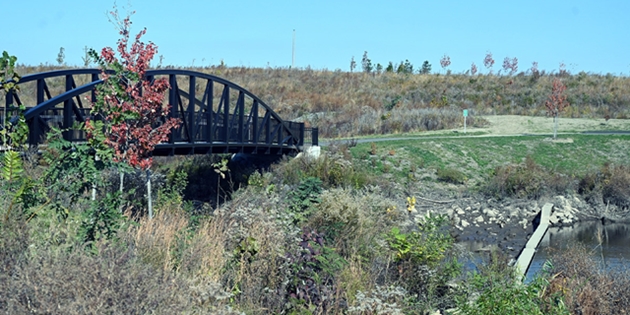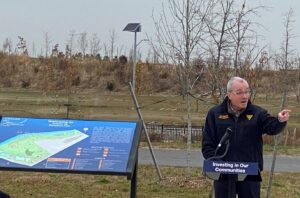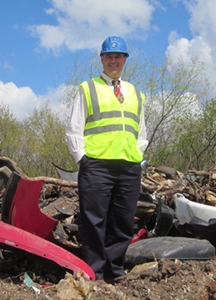Beyond the Dream to a Vision of Green
A Rutgers Law Camden student and a Rutgers–New Brunswick alumnus helped transform an abandoned Camden landfill into a waterfront park and a community center, embracing the ideas of Martin Luther King Jr.’s vision that presaged the environmental justice movement
 Cramer Hill Waterfront Park in Camden opened in November.
Cramer Hill Waterfront Park in Camden opened in November.
Less than four months before his life ended at the age of 39, Martin Luther King Jr. preached a Christmas Eve sermon where he said, “All life is interrelated.” As Drew Dellinger wrote in The New York Times on the 50th anniversary of that sermon, King helped lay the groundwork for what would become known as environmental justice. “Dr. King on that morning, in his last Christmas sermon before his assassination, anticipated much of the ecological consciousness and environmental concerns of the next 50 years, and the links between ecology and social justice that are vital to our present and future,” Dellinger said.

Armando Alfonso, Rutgers Law student, worked on the Cramer Hill Waterfront Park project.
A long-term project to transform the contaminated former landfill site on Harrison Avenue in Camden into Cramer Hill Waterfront Park, which opened in November, is an example of environmental justice in action, of which King would surely applaud. “Environmental justice is always tied to everything we are doing,” said Armando Alfonso, a Rutgers Law in Camden student and an environmental engineer with the New Jersey Department of Environmental Protection (NJDEP) who worked on the Cramer Hill Waterfront Park project, among other environmental projects in Camden. The Cramer Hill Waterfront Park, which at 62 acres makes it the largest park in the city of Camden, wraps along the shore where the Delaware River and the Cooper River meet, about one mile from Rutgers University–Camden’s campus. It features a fishing plaza, hiking and biking trails, a kayak launch, a picnic area, a playground, a sensory garden and shoreline observation areas. At a ribbon-cutting event for the park attended by officials including Gov. Phil Murphy and U.S. Rep. Donald Norcross, Murphy spoke of the park’s environmental justice achievement. “Justice comes in all forms, and today is about environmental justice for the families of Cramer Hill,” Murphy said.

Gov. Phil Murphy at a ribbon-cutting event for the Cramer Hill Waterfront Park.
Alfonso, who earned an engineering degree from Rutgers–New Brunswick in 2013, is on track to earn his juris doctorate degree from Rutgers Law in Camden this year. A native of Trenton whose parents migrated there from Puerto Rico, he studied law while working full-time for the NJDEP as the Community Collaborative Initiative liaison to Camden, working on priority environmental issues and key projects in Camden. He recently moved into a new role with the NJDEP Office of Enforcement Policy. He said ensuring that Camden residents have access to their waterways has been a key goal of the state’s environmental efforts. “Bringing people the opportunity to have access to the water was an overarching theme throughout all of our work in Camden,” Alfonso said, adding that in addition to Cramer Hill, he also worked on Phoenix Park in the Waterfront South neighborhood. It opened in 2017 and offers waterfront access to residents who, because of industrial sites along the Delaware River’s edge, had not had meaningful connection to the river since the 19th century. Alfonso said it is rewarding to know that “there are children growing up in Camden who now have the opportunity to go kayaking and fishing.”

Rutgers alumnus Frank McLaughlin, a manager for NJDEP, at the abandoned landfill site in 2012
Alfonso worked closely with Frank McLaughlin, manager of the NJDEP’s Community Collaborative Initiative, who began working on efforts to transform the Harrison Avenue landfill in 2003. “This landfill was an 86-acre, 50-foot-high mountain of garbage literally left behind in 1971,” McLaughlin said, adding that it often caught on fire and cliffs of trash would often fall into the river. “It was really eye-opening to see the egregious environmental injustices in Camden.” Rutgers–Camden Chancellor Antonio D. Tillis praised the project's connection to King's message. "I am proud that our University has thought outside the box in honoring Dr. Martin Luther King Jr.," Tillis said. "As a native of Memphis, Tenn., the site of Dr. King's tragic assassination, I am particularly conscious of the depth and breadth of his legacy. While Dr. King was a force in the fight for racial justice, Armando Alfonso and Frank McLaughlin have highlighted his environmentalist vision, showing that his wisdom and peaceful strength can apply to many different facets of social justice." McLaughlin, who holds master’s degrees in both environmental science and geological science from Rutgers–New Brunswick, said his perspective on the Cramer Hill project changed when his first child was born in 2006. “I remember standing on the landfill and looking at the row homes right across the street and thinking how unfair it is that there are children being born who have to live next to an 86-acre landfill,” he said. “The injustice of it for me went to a different level when I had children.” The first efforts to remediate the polluted landfill area focused on the development of the Salvation Army Kroc Center, which was funded in large part by a competitive $59 million gift from the estate of Joan B. Kroc. In a major undertaking that took more than eight years, the Kroc Center site was cleaned up using $30 million from NJDEP’s Hazardous Discharge Site Remediation Fund. The U.S. Environmental Protection Agency also contributed $1.6 million to the project. The center was built on 24 acres of the transformed former landfill and opened in 2014. Building on that success, NJDEP and its partners turned to the Cramer Hill Waterfront Park, which was funded with $48 million from the state and constructed by the NJDEP’s Office of Natural Resource Restoration. It opened to the public in November. “Projects of this size take a generation,” McLaughlin said. “It has been the greatest project I’ve worked on in my 33 years at the DEP.” As the nation pauses to celebrate King’s 92nd birthday, McLaughlin said there is a connection between King’s messages and the environmental justice projects he and Alfonso undertake. “Like Martin Luther King Jr., we are motivated to help people who shouldn’t have to live in an unjust world,” he said. “We have a long way to go, but transforming this landfill is a great story. If you can take the largest contaminated site in Camden and turn it into a facility like the Kroc Center and have the largest urban park in the city with the most waterfront access, that’s pretty special.” Rutgers–Camden's Office of Civic Engagement is hosting the virtual Beyond the Dream speaker series to celebrate the life and legacy of Martin Luther King Jr. For more information and to register to join online, visit the event page.


